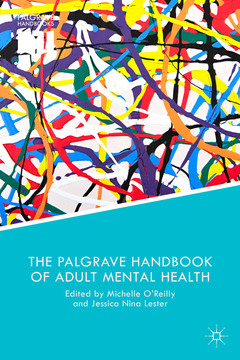The Palgrave Handbook of Adult Mental Health, 1st ed. 2016
Coordonnateurs : O'Reilly Michelle, Lester Jessica Nina

This Handbook gathers together empirical and theoretical chapters from leading scholars and clinicians to examine the broad issue of adult mental health. The contributors draw upon data from a variety of contexts to illustrate the multiple ways in which language as action can assist us in better understanding the discursive practices that surround adult mental health. Conversation and discourse analysis are useful, related approaches for the study of mental health conditions, particularly when underpinned by a social constructionist framework. In the field of mental health, the use of these two approaches is growing, with emergent implications for adults with mental health conditions, their practitioners, and/or their families.
Divided into four parts; Reconceptualising Mental Health and Illness; Naming, Labelling and Diagnosing; The Discursive Practice of Psychiatry; and Therapy and Interventions; this Handbook provides a comprehensive overview of current debates regarding adult mental health.
Introduction: The Social Construction of Normality and Pathology; Michelle O'Reilly and Jessica Nina Lester
PART I: RECONCEPTUALISING MENTAL HEALTH AND ILLNESS
1. The History and Landscape of Conversation and Discourse Analysis; Jessica Nina Lester and Michelle O'Reilly
2. Using Discourse and Conversation Analysis to Study Clinical Practice in Adult Mental Health; Nikki Kiyimba
3. The Research Interview in Adult Mental Health: Problems and Possibilities for Discourse Studies; Julie Hepworth and Chris McVittie
4. Inclusive Conversation Analysis with Disabled People; Val Williams, Marcus Jepson, Lisa Ponting and Kerrie Ford
5. The Discursive Construction of Drug Realities: Discourses on Drugs, Users and Drug Related Practices; Benno Herzog
6. The Construction of Adult ADHD: Anna's Story; Mary Horton-Salway and Alison Davies
7. Using Discourse Analysis to Investigate How Bipolar Disorder is Constructed as an Object; Lynere Wilson and Marie Crowe
8. Discourses of Autism on Film: An Analysis of Memorable Images that Create Definition, Andrea Garner, Valerie Harwood and Sandra C. Jones
9. Abuse Victimes and High Profile Offenders: A Discourse Analysis of Victim Construction and Adult Mental Health; Naima Fowlis, Michelle O'Reilly and Mary Farrelly
PART II: NAMING, LABELLING AND DIAGNOSING
10. Diagnosis as an Interactional Achievement in Psychiatric Interviews; Carles Roca-Cuberes
11. Psychogenic Non-epileptic Seizures: How Doctors Use Medical Labels When They Communicate and Explain the Diagnosis; Chiara M. Monzoni and Markus Reuber
12. The Process of Social Labelling of Mental Illness: An Analysis of Family Conversations; Milena Lisboa and Mary Jane Spink
13. Making Mental Disorders Visible: Proto-morality as Diagnostic Resource in Psychiatric Exploration
14. The Role of Self-Disclosure in the Social Construction of Understandings of Alcoholism and Mental Health within Talk between Members of Alcoholics Anonymous; Matthew Thatcher
15. "But How Often Does This Happen?" Problem Reducing Responses by Coaches in E-mail Counselling; Joyce Lamerichs and Wyke Stommel
16. Does Ana=Anorexia? Online Interaction and the Construction of New Discursive Objects; David Giles
PART III: THE DISCURSIVE PRACTICE OF PSYCHIATRY
17. Exploring the Heterogeneity of "Schizophrenic Speech"; Lisa Mikesell and Elizabeth Bromley
18. Mental Health Treatment Planning: A Dis/empowering Process; Michael Mancini
19. Team Work in Action: Building Grounds for Psychiatric Medication Decisions in Assertive Community Treatment; Beth Angell and Galina Bolden
20. 'Good' Communication in Schizophrenia: A Conversation Analytic Definition; Laura Thompson and Rose McCabe
21. 'Talk About Trouble': Practitioner Discourses on Service Users Who Are Judged to be Resisting, Contesting or Evading Treatment; Michael Hazelton and Rachel Rossiter
22. Using Talk to Rehabilitate: Analysing Therapeutic Conversation between a Learning Disabled Offender with ASD and a Forensic Speech and Language Therapist; Sushie Jayne Dobbinson
23. A Critical Discursive Perspective on Psychiatric Hospitals; Claire Bone and Nichola Marchant
PART IV: THERAPY AND INTERVENTIONS
24. Discursive Awareness and Resourcefulness: Bringing Discursive Researchers into Closer Dialogue with Discursive Therapists?; Tom Strong
25. Therapeutic Practice as Social Construction; Kenneth Gergen and Ottar Ness
26. The Value of Using Discourse and Conversation Analysis as Evidence to Inform Practice in Counselling and Therapeutic Interactions; Nikki Kiyimba and Michelle O'Reilly
27. Interactional Practices of Psychotherapy; Liisa Voutilainen and Anssi Peräkylä
28. Finding the Middle Ground between Therapist-centred and Client-centred Metaphor Research in Psychotherapy; Dennis Tay
29. Storytelling, Depressing and Psychotherapy; Peter Muntigl
30. Using Discourse Analysis to Develop Understanding of Suicide Risk Assessment; Ric Bowl and Andrew Reeves
31. Communicative Practices in Staff Support of Adults with Intellectual Disabilities; Charles Antaki, Mick Finlay, Chris Walton and Joe Sempik
32. Discovering Mental Ill Health: 'Problem-solving' in an English Magistrates' Court; Timothy Auburn, Cordet Smart, Gisella Hanley Santos, Jill Annison, and Daniel Gilling
33. Discourses of Abuse and Recovery: Talking About Domestic Violence and its Implications for Therapy; Henderikus Stam, Michaela Zverina, Lorraine Radtke and Robbie Babins-Wagner
34. When Assistance is Not Given: Disaffiliative Responses to Therapeutic Community Clients' Implicit Requests; Marco Pino
Michelle O'Reilly is Senior Lecturer at the University of Leicester, Greenwood Institute of Child Health, UK. She specialises in discourse and conversation analysis of child mental health interactions. Michelle has a particular interest in childhood autism and has published books and papers in both mental health and autism.
Jessica Nina Lester is Assistant Professor at Indiana University, Bloomington, USA. She teaches research methods courses, including discourse analysis. Her research is focused on the study and development of qualitative methodologies, with much of her work positioned at the intersection of discourse studies and disability studies.
Date de parution : 04-2016
Ouvrage de 704 p.
15.5x23.5 cm
Disponible chez l'éditeur (délai d'approvisionnement : 15 jours).
Prix indicatif 158,24 €
Ajouter au panierThèmes de The Palgrave Handbook of Adult Mental Health :
Mots-clés :
mental health; discourse; language; linguistics; discourse analysis; conversation analysis; social constructionism; critical approaches; alcohol; attention deficit hyperactivity disorder (ADHD); autism; autism spectrum disorder; counseling; diagnosis; Exploration; interaction; intervention; interview; online; psychiatry; psychotherapy; suicide; Therapeut



